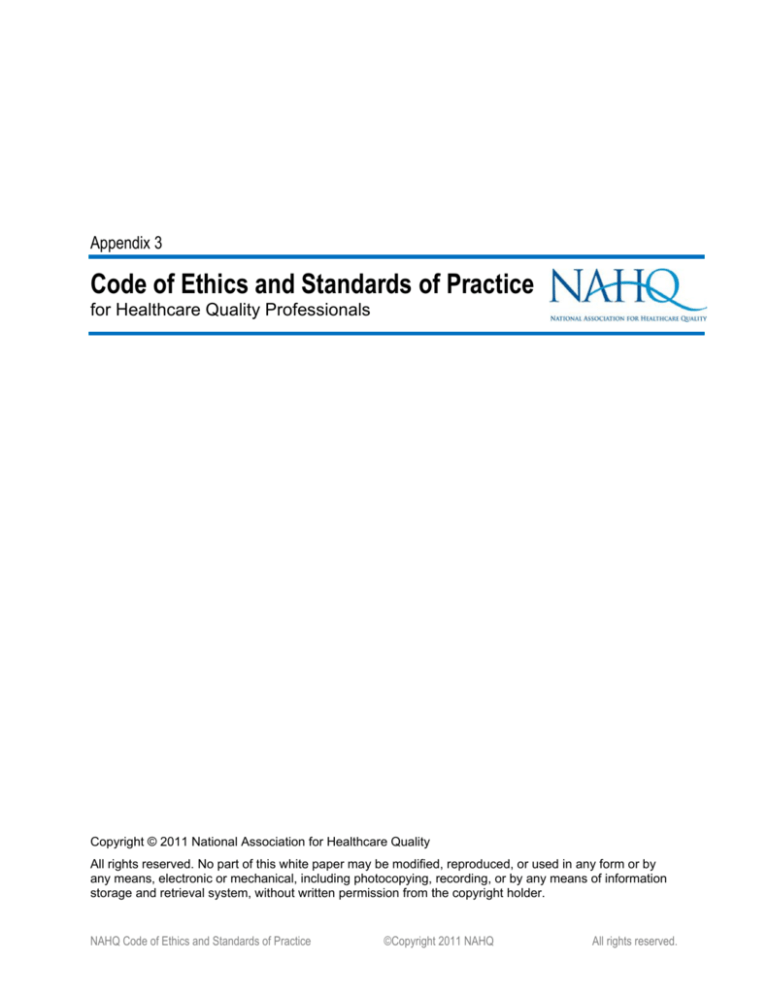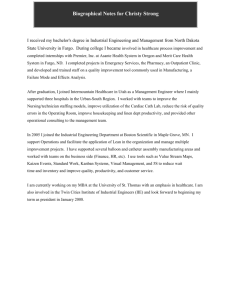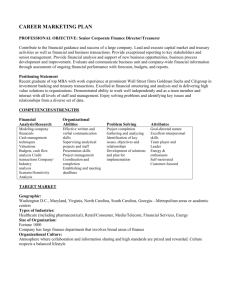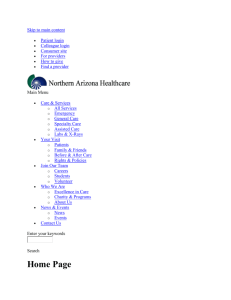
Appendix 3
Code of Ethics and Standards of Practice
for Healthcare Quality Professionals
Copyright © 2011 National Association for Healthcare Quality
All rights reserved. No part of this white paper may be modified, reproduced, or used in any form or by
any means, electronic or mechanical, including photocopying, recording, or by any means of information
storage and retrieval system, without written permission from the copyright holder.
NAHQ Code of Ethics and Standards of Practice
©Copyright 2011 NAHQ
All rights reserved.
Code of Ethics for Healthcare Quality Professionals1
Healthcare Quality Professionals are defined by a standard of conduct deep-rooted in
commitment, confidentiality, and relationships. Committed to performance improvement
and maintaining integrity, the Healthcare Quality Professional recognizes personal
accountability and moral obligation to all customers served—clients, employees,
employers, physicians, organizations, and the public.
Healthcare Quality Professionals promote the dignity of the profession and are
committed to practicing the profession with honesty, integrity, and
accountability…respecting all laws and refusing to participate in or conceal any
unethical2, false, fraudulent, or deceptive activity…
•
•
•
•
•
•
•
•
•
•
•
•
practicing the profession with honesty, integrity, and accountability
maintaining the level of competency as outlined in the Standards of Practice for
Healthcare Quality Professionals
seeking the trust and confidence of all customers
supporting the Standards of Practice for Healthcare Quality Professionals
respecting all laws and avoiding involvement in any false, fraudulent, or
deceptive activity
promoting the right of privacy for all individuals and protecting the maintenance of
confidential information to the fullest extent permitted by law
using expertise to inform employers or clients of possible positive and negative
outcomes of management decisions in an effort to facilitate informed decision
making
giving credit for the work of others to whom it is due
aiding the professional development and advancement of colleagues
using the Certified Professional in Healthcare Quality (CPHQ) designation only
after passing the written examination, adhering to standards established by the
Healthcare Quality Certification Board (HQCB), and continuing to maintain those
standards through the recertification process
maintaining membership in professional organizations as a means of promoting
quality and professional growth and avoiding the use of such membership for the
sole purpose of solicitation of business or for personal financial gain.
Healthcare Quality Professionals’ primary commitment is to the health, well
being, and safety of patients.3 They must take appropriate actions regarding any
instances of incompetent, unethical, illegal, or impaired practice.4 They work to
promote cultural change that encourages the reporting of events that may result
in actual or potential harm to patients or others.5
1
www.nahq.org/about/content/code.html
Reference: American Health Information Management Association
Reference: American Nurses Association
4
ibid
5
Reference: American Society for Healthcare Risk Management
2
3
NAHQ Code of Ethics and Standards of Practice
©Copyright 2011 NAHQ
All rights reserved.
Standards of Practice for Healthcare Quality Professionals6
Fundamental to practice, the Healthcare Quality Professional
•
•
•
•
•
maintains active personal and professional development programs in the field of
healthcare quality and exhibits a broad range of knowledge
creates and supports an environment that fosters teamwork, emphasizes quality,
recognizes the customer, and promotes learning
maintains a commitment to the improvement of the professional through
participation in, and active support of, the local, state, and national professional
organizations
addresses concerns and takes formal actions to resolve or report the unethical or
questionable practices to the appropriate channels.
Supports the Code of Ethics for Healthcare Quality Professionals.
In the area of leadership, the Healthcare Quality Professional
•
•
•
•
pursues certification through a formal program that enhances professional
competencies and recognizes leadership in healthcare
provides for performance and quality management training and education for
organization leaders
establishes specific quality-related goals for management to measure the
organization's processes and outcomes
demonstrates management skills in the administration of programs that focus on
improved outcomes of patient care or healthcare delivery systems.
In the area of information and analysis, the Healthcare Quality Professional
•
•
•
exhibits skill in health information fundamentals, including application of basic
statistical processes, data analysis and reporting, and computer use
possesses excellent written and verbal communication skills, applicable in both
individual and organizational development
supports access to medical information by appropriate health providers,
researchers, and public health agencies, balanced with appropriate consumer
protections.
In the area of strategic quality planning, the Healthcare Quality Professional
•
•
•
provides leadership and consultative services to departments and services within
the organization in achieving regulatory, accreditation, and organizational
compliance in quality and in performance management and improvement
activities
seeks management involvement in the development of a planning approach that
supports healthcare quality and patient safety
establishes quality as the guiding principle when exploring organizational efforts
to control healthcare costs.
6
www.nahq.org/about/content/code.html
NAHQ Code of Ethics and Standards of Practice
©Copyright 2011 NAHQ
All rights reserved.
In the area of human resource development and management, the Healthcare Quality
Professional
•
•
•
•
supports programs developed to recognize achievements related to healthcare
quality
exhibits a commitment to the Code of Ethics for Healthcare Quality Professionals
ensures staff involvement in all healthcare quality team efforts
mentors others in the principles of healthcare quality.
In the area of management of process quality, the Healthcare Quality Professional
•
•
•
ensures that customer expectations guide the development and continuous
improvement of processes, products, and services
acts as an agent of change and is effective in the change process, including the
identification of opportunities to improve, the resolution of problems, and the
evaluation of the effectiveness of change
integrates training, recognition, team approach, and customer satisfaction to
create a standard approach to the continuous improvement of organizational
process.
In the area of quality and operational results, the Healthcare Quality Professional
•
•
•
promotes quality efforts as a proactive—not reactive—undertaking
ensures that personnel have the appropriate and necessary skills and tools to
evaluate problems and achieve improvements
seeks to identify root causes of problems rather than focus on individual
members or events.
In the area of customer focus and satisfaction, the Healthcare Quality Professional
•
•
•
establishes customer satisfaction as a primary goal for the organization's quality
activities
standardizes the approach for determining customer expectations
serves as a customer advocate in resolution of concerns and initiation of
performance improvement activities.
NAHQ Code of Ethics and Standards of Practice
©Copyright 2011 NAHQ
All rights reserved.








